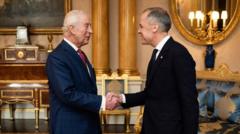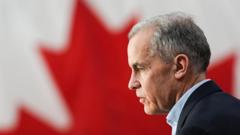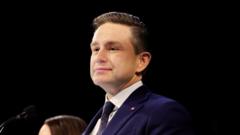Justin Trudeau's resignation as Canada's Prime Minister marks a significant chapter in Canadian politics, reflecting his extraordinary journey from celebrated leader to a figure grappling with various challenges. Trudeau was born into political royalty, being the son of Pierre Elliott Trudeau, a former prime minister, and showed early signs of his aspirations with a poignant eulogy at his father's funeral in 2000. His political career formally began in 2008 when he was elected to Parliament at just 36.
In 2013, he ascended to the Liberal Party leadership amidst a period of recovery for a party previously marred by scandals. His popularity skyrocketed following his 2015 election victory, characterized by a progressive agenda that included implementing Canada's first gender-balanced cabinet. Trudeau’s charismatic persona and effective use of social media captivated the public, earning him accolades and international attention.
A notable moment in his tenure was the introduction of a national carbon tax in 2016 aimed at tackling climate change, although this was met with criticism as it added financial pressure on ordinary Canadians. Over his decade-long leadership, Trudeau positioned himself as a staunch advocate for social issues such as gender equality and Indigenous rights, but recently, he has faced significant backlash.
His decision to step down was influenced by declining public support, rising opposition criticisms regarding his effectiveness, and internal party pressures. Trudeau's narrative is a reminder of the unpredictable nature of political leadership, where the highest peaks can quickly lead to dramatic declines. The implications of his exit remain to be seen as Canada navigates its political landscapes in the wake of a leader who was once a symbol of progressive aspirations.
In 2013, he ascended to the Liberal Party leadership amidst a period of recovery for a party previously marred by scandals. His popularity skyrocketed following his 2015 election victory, characterized by a progressive agenda that included implementing Canada's first gender-balanced cabinet. Trudeau’s charismatic persona and effective use of social media captivated the public, earning him accolades and international attention.
A notable moment in his tenure was the introduction of a national carbon tax in 2016 aimed at tackling climate change, although this was met with criticism as it added financial pressure on ordinary Canadians. Over his decade-long leadership, Trudeau positioned himself as a staunch advocate for social issues such as gender equality and Indigenous rights, but recently, he has faced significant backlash.
His decision to step down was influenced by declining public support, rising opposition criticisms regarding his effectiveness, and internal party pressures. Trudeau's narrative is a reminder of the unpredictable nature of political leadership, where the highest peaks can quickly lead to dramatic declines. The implications of his exit remain to be seen as Canada navigates its political landscapes in the wake of a leader who was once a symbol of progressive aspirations.



















